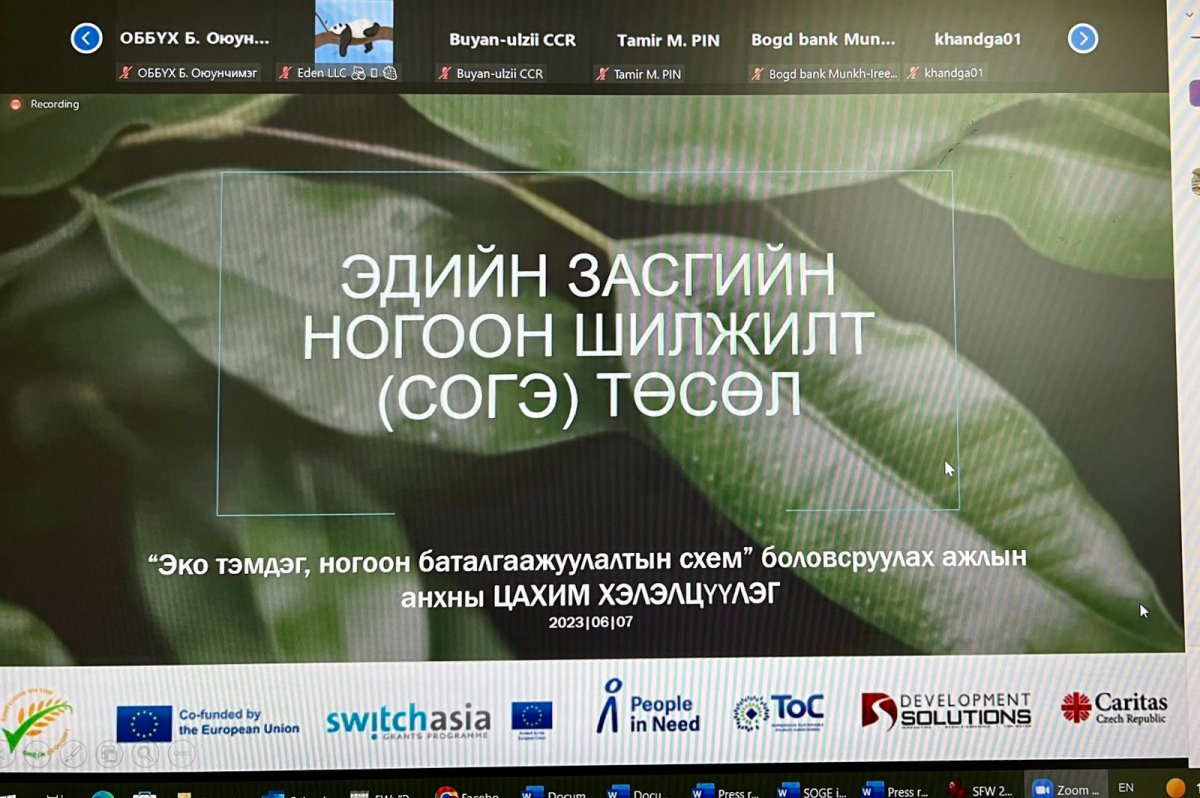Inaugural Online Discussion: Advancing the 'Eco-label and Green Certification Scheme' in Mongolia's Food, Water, and Beverage Sectors.
Published: Jun 8, 2023 Reading time: 3 minutes Share: Share an article"Switching on the Green Economy" project funded by the European Union's SWITCH-Asia Programme and collaboratively executed by People in Need INGO, Mongolian Sustainable Finance Association NGO, Development Solutions NGO, and Caritas Czech Republic INGO has started the online discussion on "Eco-label and green certification scheme".

Ulaanbaatar -- The "Switching on the Green Economy" project funded by the European Union's SWITCH-Asia Programm and collaboratively executed by People in Need INGO, Mongolian Sustainable Finance Association NGO, Development Solutions NGO, and Caritas Czech Republic INGO has started the online discussion on "Eco-label and green certification scheme".
Following extensive discussions, the standards proposed by stakeholders, incorporating their suggestions and recommendations, will undergo approval by the relevant authorities. Once approved, these standards will be implemented as a guidelines for the production of environmentally-friendly products that prioritize human health and public welfare. The resulting document will serve as a practical reference, ensuring that industries adhere to responsible practices that align with the principles of sustainability, environmental consciousness, and the overall well-being of society.
The development of a national-level "Eco label and green certification scheme" is a pioneering endeavor focused on sustainable development goals. This project aims to establish a comprehensive certification scheme, labels, standards, and criteria that verify the provision of food safety while considering environmental, governance, and social dimensions. The ultimate objective is to align these efforts with relevant indicators of sustainable development and create a scoring system and implementation manual. The responsibility for executing this important work lies with MONCERTF LLC.
The criteria of the standard for the "Eco-label and green certification scheme" consist of four distinct parts. These criteria will be raised during the online discussion as part of the initial efforts to develop the scheme. The scheme aims to incorporate various indicators related to environmental sustainability, food safety, social responsibility, and governance practices at the production level. Additionally, at the product level, the focus is on environmental sustainability and food safety indicators specifically for water and beverage products.
The discussions involve a diverse range of participants, including experts from relevant ministries, representatives from micro, small, and medium-sized producers (MSMEs), standard metrology experts, and representatives from banking and financial institutions. These stakeholders actively contributed to the ongoing dialogue by sharing their perspectives and insights. Their inputs play a vital role in shaping the demand for certification schemes, symbols, standards, indicators, and scoring systems. The ultimate objective is to ensure that the certification scheme effectively addresses the need for food security while considering environmental, governance, and social dimensions in alignment with the relevant SDGs.
Under the initiative called "Switching on the Green Economy," the focus is on equipping micro, small, and medium-scale producers (SMEs), distributors, and consumers within Mongolia's food, water, and beverage industry with the necessary knowledge to embrace eco-friendly production and consumption practices. The project aims to introduce various approaches, such as market-based eco-labels, while also providing information on available sources of green financing. Additionally, the initiative seeks to extend support in transitioning towards a circular economy (CEE) by promoting sustainable practices.
* * *
The SWITCH-Asia Programme:
The SWITCH-Asia regional programme was launched in 2007 as part of the European Union’s priority to support a programme of sustainable consumption and production (SCP) in its regional cooperation strategy with Asia. As of 2023, the programme covers 41 countries in Asia, the Middle-East and the Pacific. It addresses emerging economies as well as least-developed and major CO2 emitting countries. Its mission is to support the transition of countries to a low-carbon, resource-efficient and circular economy while promoting sustainable production and consumption patterns within Asia, the Middle-East and the Pacific, and greener supply chains between these regions and Europe.
Contact:
Tina Puntsag, Communications, and Advocacy Manager, People in Need(PIN) INGO at tina.puntsag@peopleinneed.net;
Lkhagvasuren Galbadrakh, Switching on the Green Economy (SOGE) Project Manager at lkhagvasuren.galbadrakh@peopleinneed.net



